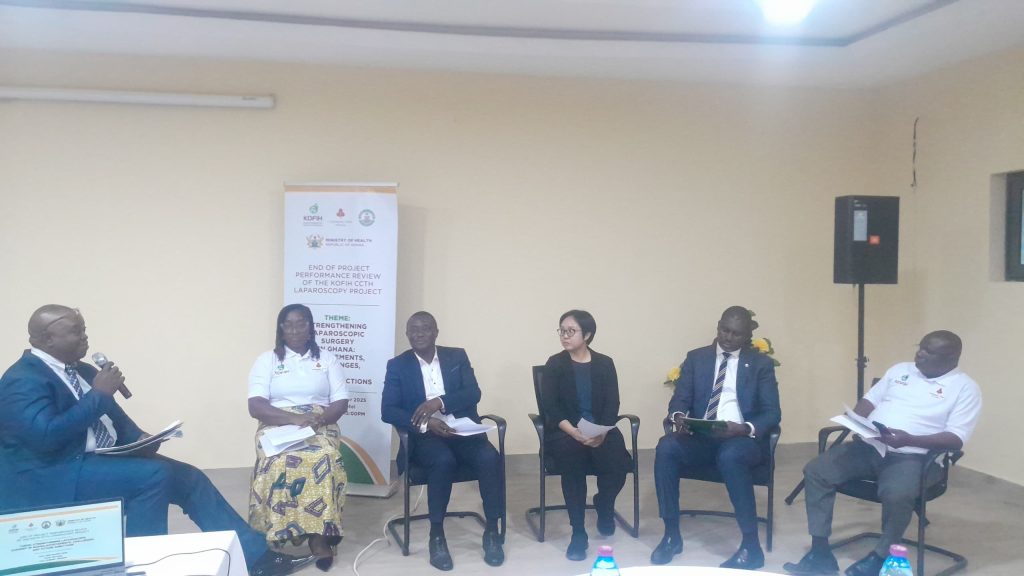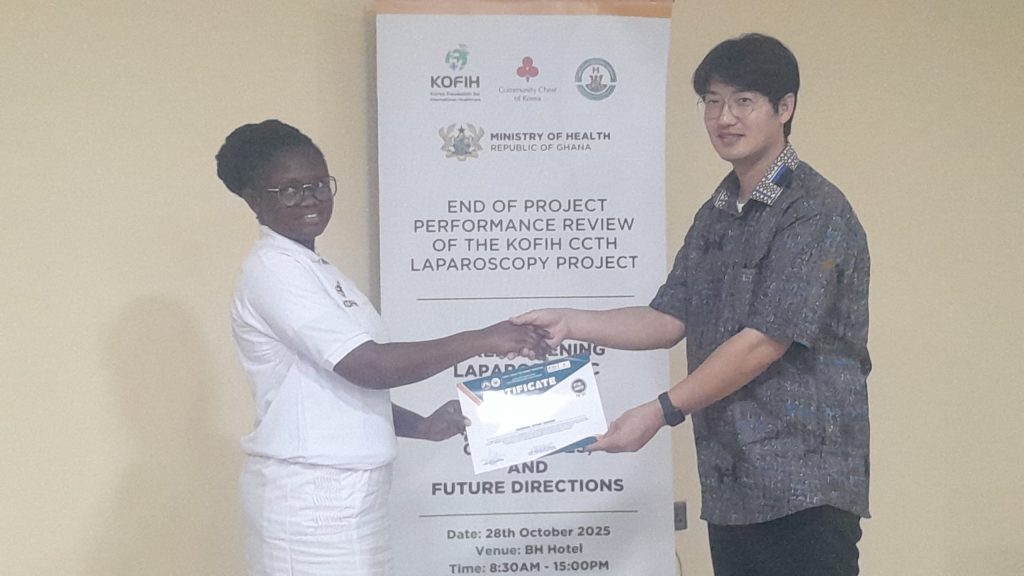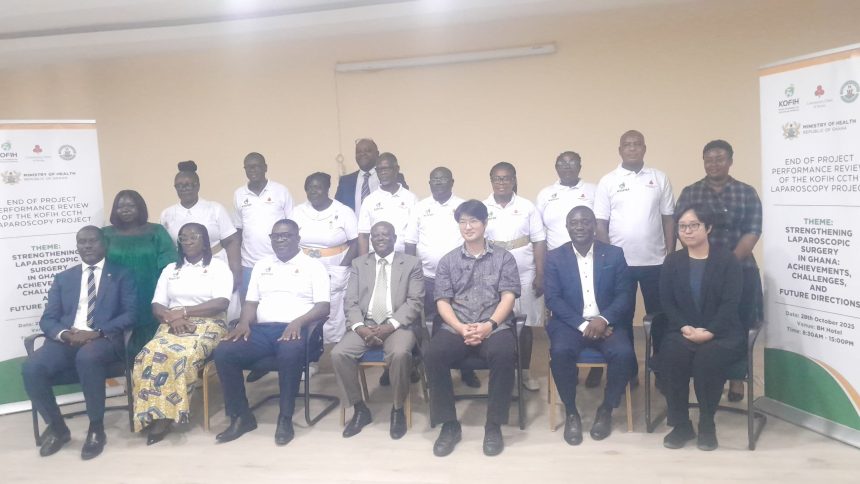Some medical experts and other stakeholders of the health sector, have called on the government to take urgent steps to incorporate laparoscopic surgery into mainstream health services to make it more accessible and affordable.
Specifically, they have urged the Ministry of Health to develop a comprehensive policy with dedicated funding to support the establishment and operations of laparoscopic centres across all major health facilities in Ghana.
They made the call at the end of project performance review of the Korea Foundation for International Healthcare (KOFIH) and Cape Coast Teaching Hospital (CCTH) laparoscopy project held in Cape Coast.
It was held on the theme: “Strengthening Laparoscopic Surgery in Ghana: Achievements, Challenges and Future Directions.”
Laparoscopy refers to a “minimally invasive” surgical technique that uses small cuts and long, thin instruments with a camera to undertake procedures in the body, reducing pain, recovery time, and complications.
The KOFIH-CCTH laparoscopic project helped to established a laparoscopy centre at CCTH and had trained some 31 staff including surgeons, anaesthetists, nurses and biomedical engineers in laparoscopic procedures, making the hospital the only facility in the Central Region with laparoscopic services.
So far, 15 patients have successfully undergone laparoscopic surgeries at the facility under the two-year project, with the hospital acquiring simulation machines to support continuous professional training.
Speaking at a roundtable, the medical experts highlighted the importance of laparoscopy and underscored the need to expand services through a deliberate government intervention.
Dr Agyen Mensah, a former Head of Surgery at the University of Cape Coast Hospital and CCTH, expressed the concern that laparoscopic surgeries, though critical, were sorely expensive and could only be afforded by the affluent in society.
Citing funding as the major challenge, he observed that the cost of establishing a centre including the cost of towers, consumables, and taxes, made laparoscopic surgeries expensive and out of reach of most people.
Experts say it costs about 311,000 dollars to establish a laparoscopic centre.
However, Dr Mensah expressed the belief that with a clear plan and funding from the government, laparoscopic surgery could easily become regular and affordable service across the country, indicating that it was a national policy in many countries.
“To say that laparoscopic surgery is a luxury is unbelievable because in terms of infrastructure we can do it. We say it is expensive to set up, but with about one million dollars, we can supply three or four hospitals,” he said.
“We can afford it if we get our priorities right. We need to get a clear plan, so that it can feature in every teaching hospital and gradually become a part of services for regional hospitals,” he stressed.
Dr Mensah observed with worry that excessive bureaucracies were driving away potential investors in the area, urging authorities to remove the bottlenecks to allow investors to come in and support.
Dr Ralph Armah, the Medical Director of the Tema General Hospital, echoed the sentiments of Dr Mensah and reiterated the need for all stakeholders to find a way of bridging the gap.
He emphasised that as essential as it was, laparoscopic services must not be reserved for a privileged few in the society, calling for more advocacy on the area.
Dr Agnes Achiamaa Anane, Deputy Director of Clinical Care, Central Regional Health Directorate, pictured an enhanced healthcare delivery system if laparoscopic surgery were mainstreamed.
She, however, raised concerns about limited human resources and called for the training of more professionals for the service.
Dr Kang Mee Joo, National Cancer Centre, South Korea, observed that there was a limited knowledge of laparoscopy in Ghana and emphasised the need to create more awareness to revolutionize surgical procedures in the country.
Dr Eric Kofi Ngyedu, the CEO of CCTH, explained that the main goals of the project were to provide high-quality medical services through strengthened laparoscopic surgery capacity and enhance hospital management efficiency.
He indicated that the hospital earlier, had no laparoscopic surgical services with limited human resource capacity in this specialised area, expressing appreciation to KOFIH for the project and the Ministry of Health for its support.
He said the milestone reflected the nation’s ongoing commitments to modernising surgical care and aligning with global trends in minimally invasive procedures.

“Looking ahead, CCTH remains deeply committed to strengthening and expanding laparoscopic services.
“Our vision is to build on this solid foundation, enhance staff capacity further and broaden our equipment base, including the acquisition of advanced anaesthesia machines and other surgical tools,” he said.
Dr Ngyedu noted that their commitment to sustaining laparoscopic services had already opened avenues for new partnerships and collaborations as they strive to make CCTH a centre of excellence for laparoscopic surgery and training in Ghana.
Dr Bomin Yang, Country Director, KOFIH, stated that the project was important to enhance the safety of patients with minimally invasive surgery as they recovered faster after surgery.
He said KOFIH provided financial and technical support to ensure the project was successful to position CCTH as the ultimate health care provider.
Dr Yang disclosed that KOFIH was working with several other institutions in Ghana on other projects including mother and child, biomedical engineering and emergency services to improve the country’s health system.
Mr Ekow Panyin Okyere Eduamoah, the Central Regional Minister, in a statement read on his behalf, said the introduction of the laparoscopic service represented a quantum leap in health care delivery in Ghana.
He urged CCTH to expand its laparoscopic services and increase awareness on the procedure among the local communities and healthcare providers, indicating that it would stimulate demand for the service.
“I also call on the Ministry of Health and other stakeholders to explore opportunities for sustaining and scaling up this initiative,” he added.
Mr Justice Arthur, the Mayor of Cape Coast, acknowledged the role of good health in economic growth and reaffirmed his commitment to prioritising quality health care.
He promised to work with the Members of Parliament in Cape Coast to fix the deplorable road, which led to the laparoscopic centre to provide relief for patients and the medical staff.

Mr Kafui Akpedonu, Project Coordinator, CCTH, touted the success of the project, but lamented the high cost of consumables and the lack of adequate anaesthesia machines as the major challenges.
“We want to say that this centre has come to stay to serve three catchment regions and we want to expand the base to serve other regions and partners who may want to learn from us,” he stated.
GNA






